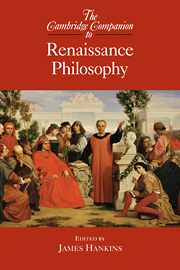Book contents
- Frontmatter
- 1 Introduction
- Part I Continuity and Revival
- Part II Toward Modern Philosophy
- 9 Nicholas of Cusa and modern philosophy
- 10 Lorenzo Valla and the rise of humanist dialectic
- 11 The immortality of the soul
- 12 Philosophy and the crisis of religion
- 13 Hispanic scholastic philosophy
- 14 New visions of the cosmos
- 15 Organizations of knowledge
- 16 Humanistic and scholastic ethics
- 17 The problem of the prince
- 18 The significance of Renaissance philosophy
- Appendix: Brief biographies of Renaissance philosophers
- Bibliography
- Index
11 - The immortality of the soul
from Part II - Toward Modern Philosophy
Published online by Cambridge University Press: 28 November 2007
- Frontmatter
- 1 Introduction
- Part I Continuity and Revival
- Part II Toward Modern Philosophy
- 9 Nicholas of Cusa and modern philosophy
- 10 Lorenzo Valla and the rise of humanist dialectic
- 11 The immortality of the soul
- 12 Philosophy and the crisis of religion
- 13 Hispanic scholastic philosophy
- 14 New visions of the cosmos
- 15 Organizations of knowledge
- 16 Humanistic and scholastic ethics
- 17 The problem of the prince
- 18 The significance of Renaissance philosophy
- Appendix: Brief biographies of Renaissance philosophers
- Bibliography
- Index
Summary
The scope of the immortality debate in the Renaissance
The debate during the Renaissance over the immortality of the soul encompassed epistemology, metaphysics, and theology. The metaphysical question was whether there is something spiritual that gives life to human beings, such that they are endowed with an ontological status superior to animals and a lasting reality. If this is true, then there is a human soul that transcends the perishable body. But a problemarises: what is the evidence for this, and what does it mean for man to be essentially spiritual? If one were to deny the need for any ontological difference between beasts and men - and that would entail abolishing the principle of life or soul as something distinct from body - then the fact of consciousness and truth over and beyond particular beings demands explanation.
Hence an epistemological problem arises from the metaphysical one. For the mere possibility that animation and spirit might be illusions or misconceptions of life and thought raises a question of epistemology. This, however, is not to be pursued in terms of formal logic, but by way of reflection upon the working of the human mind inasmuch as it seems to be the “place” (or subject) where claims are proffered that transcend particulars and where reflexivity seems to reside. The question is, then, whether the “place” of truth is coextensive with truth itself, and - supposing truth has an ontological status beyond that of physical things - whether the mind or intellect as this “place” shares that ontological status. That is to say: is the intellect as eternal as the truths it is supposed to and tries to think?
- Type
- Chapter
- Information
- The Cambridge Companion to Renaissance Philosophy , pp. 211 - 233Publisher: Cambridge University PressPrint publication year: 2007
- 18
- Cited by

